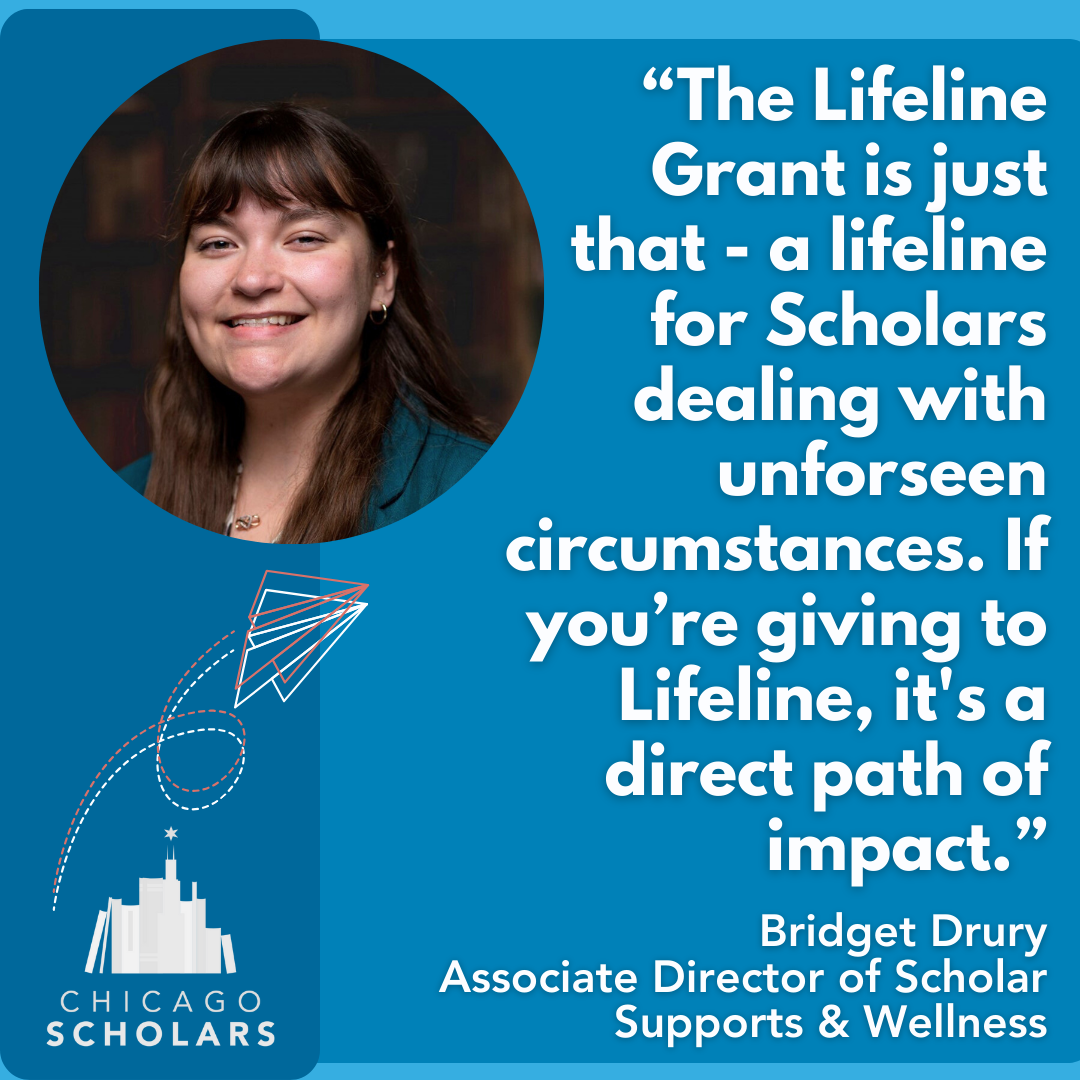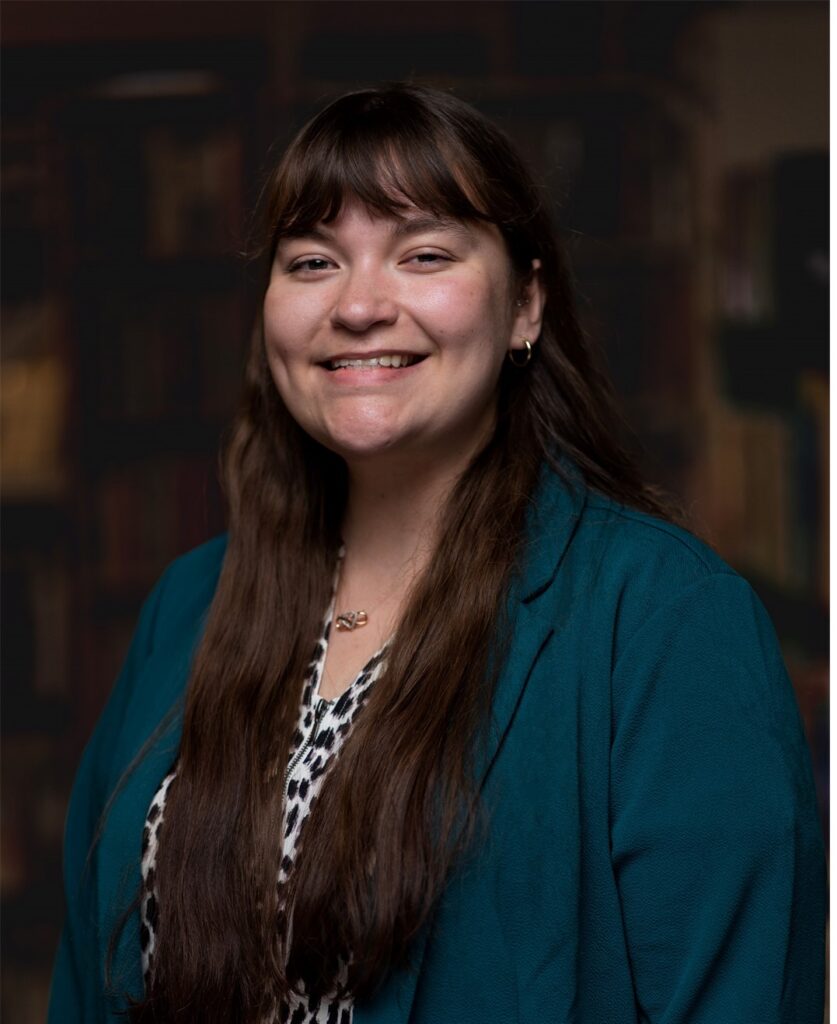Meet Bridget Drury, Associate Director of Scholar Supports & Wellness


For the past month, we’ve been walking you through the ins and outs of our Scholar Dollars and ELD Grant programs, as well as our incredible Scholarship offerings. This month, we’re bringing you some one on one interviews with scholarship funders and partners, Scholars who have received funding, and more.
We spoke with Bridget Drury, Associate Director of Scholar Supports and Wellness at Chicago Scholars, about what resources are available for Scholars to safeguard their health and wellness, the Lifeline Grant, and honoring Mental Health Awareness month all year round.
What is your role and what does it entail?
“My role is the Associate Director of Scholar Supports and Wellness. I oversee everything health and wellness related for our college Scholars, but also support other areas of the programming, such as identifying and informing Scholars of free and low-cost resources, or giving referrals, as well as having events where we teach Scholars low-cost ways to take care of themselves. When you’re a broke college student, it’s important to learn how to create balance as you’re juggling so many things. I also oversee the emergency fund, known as Lifeline. It exists to make sure Scholars have their basic needs covered when the unexpected happens. One mishap can throw your college dreams out the window. Whether that be rent or food, we make sure to holistically address their wellness, financial, and mental and physical health needs.”
What do you find fulfilling about your work?
“I really like seeing the direct impact of my work, and the work we do as an organization. For Lifeline, those funds are going to pay a college Scholar’s rent, or paying a car maintenance fee, so we can see the short-term impact. Working here for almost five years, I’ve seen a lot of Scholars graduate, and the Lifeline funding can often be crucial. Nonprofit work is often very emotionally taxing on staff – but at Chicago Scholars we can see that the work we do matters and that we really are helping our Scholars.”
What is something about your job that you wish people knew?
“I wish more people knew that Lifeline isn’t a scholarship – it’s for the unexpected. Sometimes stakeholders might think they can use it to pay for books, tuition, or other expected costs. We try to reserve the funds for students that are going through emergency situations. We don’t want people to prove their trauma or poverty. We recently had a Scholar that had an unexpected death in the family and needed to go home for the funeral and then fly back to school to take their finals. In part, I’m trying to help Scholars budget their money. Every student needs to pay for books, but we try to reserve funds for the unexpected. Every penny of the Lifeline Grant is spent each each, so I’m always trying to assess what is an emergency versus an expense.”
How does your work fit into the ecosystem of Chicago Scholars and our Scholars lives?
“I think that especially in the last couple years, the Scholars that are graduating have had a great experience, and they want to come back and help. We had a panelist that came back as an Alum to participate. He wants to help. It feeds into a phrase we like to say – ‘once a Scholar, always a Scholar.’ We can instill that sense of belonging and community and Scholars find that impactful. They feel they benefitted from our program, both in mentoring and the one–on–one support in building connections. Scholars want to come back and stay engaged with us.”
Do you have a favorite scholarship related story/memory?
“A general thought is that in the last two years, at the end of every semester or graduation season, I intentionally reach out to the Lifeline recipients. I follow up and see if they are persisting or graduating. I had several Scholars say they were graduating on time because of the Lifeline funding. One Scholar had received three Lifeline grants throughout college and when I reached out, he told me he had a job lined up after graduation. I like hearing their stories and when they share the good news. Oftentimes we get the bad news, the emergencies that need help, but it’s great to get the good.”
What does your day-to-day work look like?
“I spend most days checking Lifeline requests that come in, or reaching out or collaborating with other staff to talk to Scholars about their financial needs. Sometimes I’m working with college partners to see where they can provide support to our Scholars. I evaluate survey data and what Scholars say they need. We have the college success survey going out this month, and I look at the mental health data and see whether they’re receiving the support they need. I also work with staff to see where more partnerships can be brought in, and what resources we need to look into creating.”
Do you have anything else you want people to know about our work with Wellness for our Scholars?
I’d like people to know that by donating any amount to our Lifeline Grant, you’re making a direct impact on our Scholars and what we can offer them in emergencies, when they need us most. There is a lot of data out there that shows that emergency funds are very impactful in terms of college persistence, and the Lifeline Grant is no different. You can be part of that.